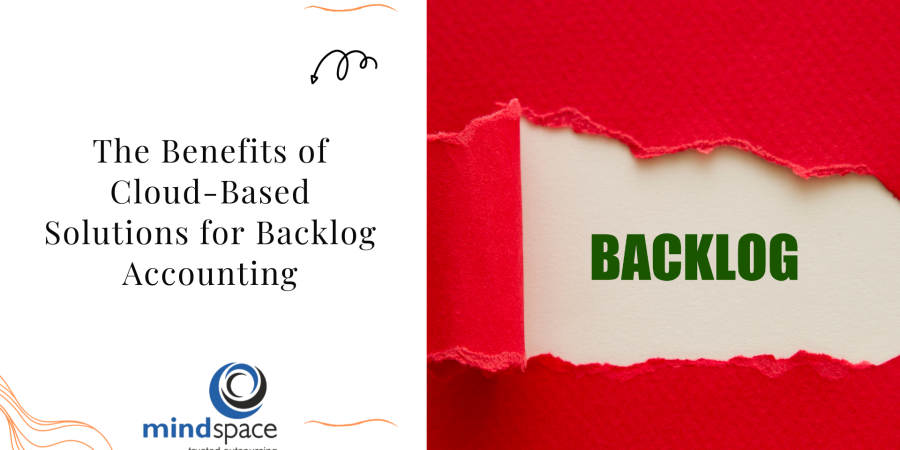The Benefits of Cloud-Based Solutions for Backlog Accounting
In today’s fast-paced business environment, it’s not uncommon for small and medium-sized enterprises (SMEs) to fall behind in their accounting. Transactions may occur but not be recorded promptly, creating a backlog of unaccounted-for financial data. Backlog accounting is a daunting task that can slow down business operations. In the past, catching up on bookkeeping often meant sifting through piles of receipts, invoices, and bank statements—an error-prone and time-consuming process. However, cloud-based solutions are transforming how businesses handle backlog accounting, offering a more efficient, accurate, and flexible approach.
In this blog, we’ll explore the significant advantages of using cloud-based tools for backlog accounting and how these solutions can help businesses save time, minimize errors, comply with regulations, and make more informed financial decisions.
- Accessibility and Flexibility
One of the most valuable features of cloud-based accounting solutions is their accessibility. Since these tools are hosted online, you can access your financial data anytime, anywhere, with just an internet connection. This flexibility is crucial for businesses trying to catch up on missed transactions and close accounting gaps.
24/7 Access: With cloud solutions, business owners and accountants can log in at any time to input data that was previously overlooked. Whether the backlog dates back several months or years, having around-the-clock access ensures that no time is wasted in clearing up records.
Real-Time Collaboration: Cloud-based systems allow multiple users to work on the same financial data simultaneously. For instance, if your business engages an external accountant or CPA to help manage the backlog, both parties can access and update the records in real-time, ensuring smoother communication and quicker results.
Multi-Device Compatibility: Cloud accounting software is compatible with various devices, including PCs, tablets, and smartphones. This means that whether you’re in the office, traveling, or working remotely, you can still keep up with your accounting work, reducing downtime and streamlining backlog accounting.
- Automation of Data Entry
Manual data entry is one of the most time-consuming aspects of backlog accounting. Going through months or even years’ worth of transactions, invoices, and receipts can be overwhelming. Cloud solutions drastically reduce this workload through automation.
Bank Feed Integration: Tools like QuickBooks Online, Xero, and Wave allow businesses to link their bank accounts and credit cards directly to the software. This feature automatically pulls transaction data, enabling businesses to enter several months or years of financial records within minutes. This is particularly beneficial for businesses with large backlogs, as it eliminates the need for tedious manual input.
Invoice and Receipt Scanning: Many cloud-based accounting platforms offer mobile apps that allow users to scan and upload receipts and invoices. This feature is particularly useful for backlog accounting, as it speeds up the process of digitizing and organizing financial records, reducing the risk of losing important documents.
Recurring Transactions: For businesses with recurring expenses like rent or subscription fees, cloud-based tools can automate these entries, ensuring no critical payments are missed, even if they were previously unaccounted for.
- Reduced Errors and Increased Accuracy
Backlog accounting often involves quickly inputting large volumes of financial data, which increases the likelihood of human error. Even minor mistakes in financial records can lead to inaccurate reports and, ultimately, poor business decisions or tax issues. Cloud-based solutions offer various features designed to reduce errors and ensure accurate data entry.
Automated Reconciliation: Most cloud accounting tools include automatic bank reconciliation features. By matching bank transactions with those entered into the system, discrepancies are immediately flagged, making it easier to detect and correct duplicate entries, missing records, or incorrect amounts—common issues in manual backlog accounting.
Real-Time Updates: Cloud-based solutions provide real-time updates, ensuring that any changes made to financial data are instantly reflected across the system. This eliminates inconsistencies and ensures that everyone working on the accounting has access to the most current and accurate information.
Audit Trails: Cloud platforms typically include detailed audit trails, capturing every change made to financial records. This makes it easy to identify where errors occurred and take corrective action, ensuring the backlog is resolved accurately and efficiently.
- Cost-Effective Solution
For SMEs, dealing with a backlog of financial data can be expensive, especially if it requires hiring additional accountants or outsourcing to a third-party firm. Cloud-based accounting tools offer a cost-effective alternative by streamlining the backlog process and reducing the need for additional personnel.
Subscription-Based Pricing: Most cloud accounting platforms operate on a subscription model, offering monthly or annual plans. These plans are generally more affordable than hiring a full-time accountant, especially when it comes to backlog work. Once the backlog is cleared, businesses can continue using the same software for ongoing accounting needs without incurring additional costs.
Scalability: Cloud solutions are highly scalable, meaning businesses can choose only the features they need and scale up as their accounting requirements grow. This flexibility ensures that businesses don’t overpay for services they don’t need while providing the option to expand their accounting capabilities as necessary.
- Enhanced Data Security
Handling backlog accounting often involves dealing with sensitive financial information. Cloud-based platforms offer robust security measures to ensure that your data remains safe, even when managing older records.
Encryption: Leading cloud accounting solutions use advanced encryption methods to protect financial data both in storage and during transmission. This ensures that sensitive information remains secure and protected from unauthorized access.
Automatic Backups: One of the biggest risks with traditional desktop accounting software is data loss. Cloud platforms automatically back up data, ensuring that even if your device is lost or damaged, your financial records are securely stored and easily retrievable.
Access Control: Cloud-based systems offer advanced access controls, allowing businesses to assign different permission levels to users. This ensures that only authorized personnel can access or modify specific financial data, reducing the risk of errors or data breaches.
- Simplified Compliance and Tax Management
Backlog accounting can create challenges in meeting tax deadlines and complying with legal regulations. Cloud-based systems are designed to help businesses stay compliant with tax laws and generate accurate reports for filing.
Tax Calculations and Reports: Most cloud accounting solutions are equipped to handle various tax requirements, such as VAT or sales tax. They can automatically calculate taxes and generate the necessary reports, ensuring that businesses stay compliant even when dealing with older financial data.
Year-End Reports: Cloud platforms provide ready-made financial statements, such as balance sheets and cash flow statements, which are crucial for tax reporting. This makes it easier to prepare and file taxes, even when dealing with backlog accounting.
- Real-Time Financial Insights
One of the most significant drawbacks of traditional backlog accounting is the lack of immediate access to financial information. Cloud-based systems provide real-time insights, even when working with older data.
Dashboard Views: Cloud accounting platforms offer customizable dashboards that provide an instant overview of a business’s financial position. This is especially useful when clearing a backlog, as it allows businesses to quickly assess their updated financial standing.
Historical Data Analysis: Cloud solutions allow businesses to compare current data with historical records, helping them identify trends, manage cash flow, and make more informed financial decisions based on accurate information.
Conclusion
Cloud-based accounting solutions offer SMEs a powerful and efficient way to handle backlog accounting. From automation and error reduction to enhanced security and cost savings, these platforms simplify the process of catching up on overdue financial records. By adopting cloud solutions, businesses not only clear their backlog but also set themselves up for future success with real-time insights, simplified compliance, and scalable tools that can grow with their needs.


